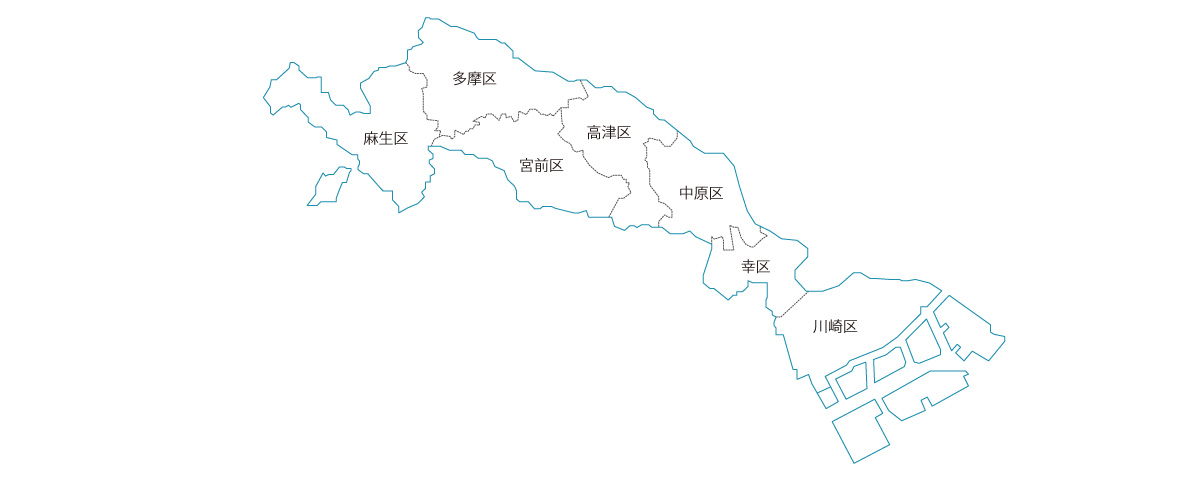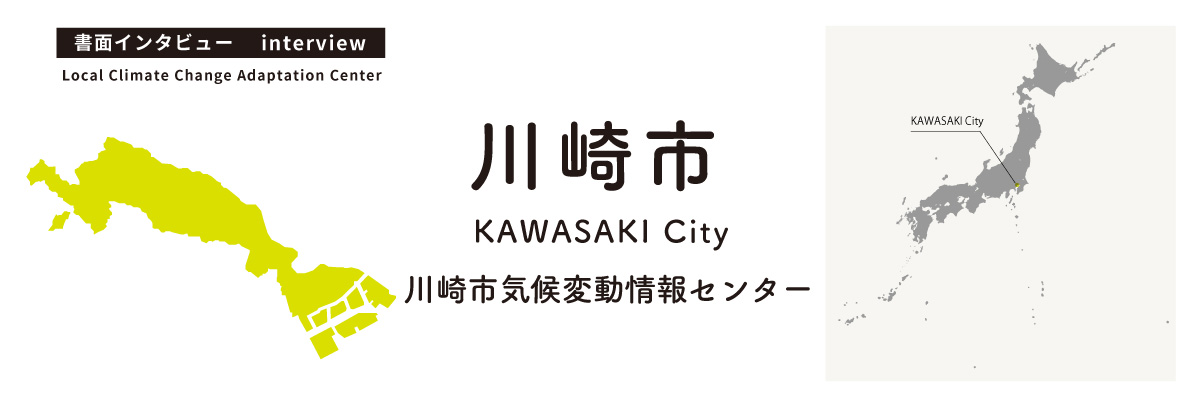Please tell us about Kawasaki City’s unique local features and characteristics, what led to the establishment of the Local Climate Change Adaptation Center, and what its organizational structure is like.
Kawasaki City is situated along the Tama River and has an elongated shape from north to south. While the municipality’s south end bordering the sea is a major industrial area where many factories, plants, and other business operations are located, its northern area including the Tama Hills and Ikuta Ryokuchi Park has abundant vegetation, so there is quite a contrast between the municipality’s two ends in the extent of urbanization.
The Kawasaki Environment Research Institute is Kawasaki City’s local environmental research organization, which had been conducting scientific research on extreme heat conditions, including surveys and research on the heat island phenomena that are caused by urbanization and analysis of data on hyperthermia cases requiring ambulance services, before the Climate Change Adaptation Center was established. In addition, Kawasaki City had been facilitating its implementation of climate change adaptation measures by officially incorporating them into the municipality’s adaptation policy and global warming action plan even before the Climate Change Adaptation Act came into effect. So when the Climate Change Adaptation Act passed the legislature, the municipality started contemplating a plan on its Local Adaptation Center pursuant to Article 13 of the Climate Change Adaptation Act and subsequently opened the Kawasaki City Climate Change Information Center on April 1, 2020, which was the first among all the cities designated by government ordinance of Japan.
As for the organizational structure, the function of the Local Climate Change Adaptation Center has been assigned to the Kawasaki Environment Research Institute, which had been conducting climate change surveys and research from before, focusing on urban heat island phenomena and extreme heat conditions. Currently, the position of Center Director is held by the Executive Director of the Environment Research Institute, and the position of Deputy Center Director by the Section Manager of the Urban Environment Section. The Center’s personnel also include one Deputy Section Manager and two staff members, so the Center is being operated by a total of five employees.

Please tell us about the current activities of Kawasaki’s Local Climate Change Adaptation Center as well as its future plans.
We understand that local climate change adaptation center’s activities can be classified into two main categories, which are information gathering and information dissemination.
In terms of information gathering, we have been fulfilling this function by conducting various investigative research activities, including the municipality’s meteorological assessment involving temperature, precipitation, and other related data, analysis of data on hyperthermia cases where emergency medical services were deployed, indoor and outdoor observation of extreme heat conditions using measuring instruments, and questionnaire surveys of municipal residents, business operators, and municipal government employees, fully leveraging the advantage of the Center being located at the Environment Research Institute. Furthermore, we have been attending seminars, symposiums, and other events hosted by the Government of Japan and been exchanging opinions and ideas with the national Center for Climate Change Adaptation as well as other Local Climate Change Adaptation Centers to gather additional information.
As for information dissemination, we have been providing information on climate change adaptation measures through seminars and other events held for municipal residents, as well as on the Kawasaki City’s official website and Twitter account. Concerning Twitter in particular, we have been frequently posting messages while making sure that they are easy to understand. As a result, although our account only had about 450 followers when the Center had just opened, the follower base increased to roughly 800 as of December 2021, so our information campaign to spread knowledge on climate change adaptation measures has been effective so far in our view.
In addition, we applied this fiscal year to participate in the Ministry of the Environment’s FY 2021 municipal model projects for the facilitation of effective measures to prevent hyperthermia and qualified as one of the member municipalities. We then conducted several activities involving public education, surveys, and research on hyperthermia prevention. More specifically, we attended neighborhood associations, participated in select events to raise awareness on hyperthermia prevention specifically targeting elders, monitored extreme heat conditions in residential settings, and analyzed hyperthermia risks that might manifest in Kawasaki City in the future. Through these activities, we were able to gather useful information and insight, effectively raise public awareness on hyperthermia prevention, and achieve numerous other results. We remain committed to coordinating with other departments of the municipal government and promoting climate change adaptation through FY 2022 and beyond.
Please tell us about any unique approach that your Local Climate Change Adaptation Center is taking to effectively coordinate with other departments of the Kawasaki City Government and to facilitate adaptation by the city and businesses, as well as any issues, etc. you are experiencing.
Kawasaki City has set up its climate change adaptation working group (“WG”) within the municipal government to discuss and contemplate adaptation measures, through which the Local Climate Change Adaptation Center is coordinating with other departments. When we held a WG conference at the start of this fiscal year and gave a presentation explaining our plan for the hyperthermia prevention model project hosted by the Ministry of the Environment, many departments offered to cooperate, which allowed us to turn our public education campaign on hyperthermia prevention into an initiative of the entire city government. As it is important to have direct communication with various stakeholders when trying to promote adaptation measures with them, we have been actively approaching and conversing with event organizers, neighborhood associations, etc. to offer information sessions in conjunction with other departments of the municipal government.
Meanwhile, we are still exploring ways through which to effectively promote adaptation measures with business operators. As Kawasaki City is a major industrial center, we believe there is certainly a necessity for businesses to implement appropriate adaptation measures. However, from their perspective, adaptation measures might need to encompass hyperthermia, infectious disease, water management, flood and storm surge control, etc. so they apparently tend to find it difficult to decide what actions should be taken first. To address this, we are reviewing how best to approach adaptation facilitation in an effective manner. For this purpose, we are intent on continuously communicating with the National Institute for Environmental Studies and other Local Climate Change Adaptations Centers for in-depth information sharing, and exchange of opinions and ideas.
Please tell us what motivates you to do your current work and also your outlook on the future.
Because climate change is a global issue, being informed on the topic and adaptation measures will become increasingly important as we head into the future. Meanwhile, as climate change adaptation involves wide-ranging areas, it is necessary not only for the municipal departments that are concerned with the environment but also for Kawasaki City residents, business operators, and other departments of the municipal government to take actions in a well-coordinated manner. To this end, we believe it would be quite vital for us to obtain novel insight on the socially important topic of climate change impact through robust surveys and research and to facilitate adaptation measures implementation at scale by disseminating key information in a creative and effective manner. At any rate, we believe it is a highly important role of the Local Climate Change Adaptation Center to provide municipal residents with crucial information that is rooted in scientific evidence found through our investigative research work, in such a digestible manner that would urge them to alter their behavior and take any necessary adaptation measures. As climate change brings about imminent impacts, we are committed to conducting our activities expeditiously at the Local Climate Change Adaptation Center with a sense of urgency.
(Posted on February 28, 2022)


